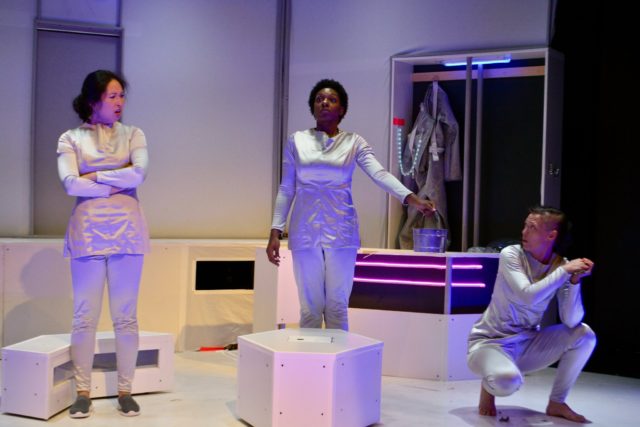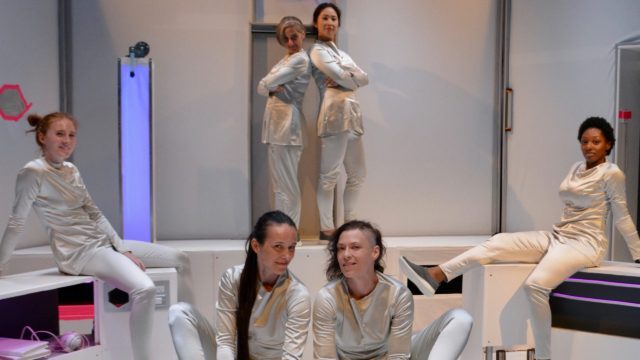
Edward Einhorn’s Alma Baya can be seen in person or online (photo by Arthur Cornelius)
ALMA BAYA
A.R.T./New York, Jeffrey and Paula Gural Theatre
502 West Fifty-Third St. at Tenth Ave.
August 13-28, $25 in person ($15 until August 25 with code UTC61); available on demand through September 19, $25
www.untitledtheater.com
Writer-director Edward Einhorn’s Alma Baya is a claustrophobic, vastly entertaining sci-fi parable for this moment in time, an absurdist look at what comes next. The play can be seen in person through August 28 at A.R.T./New York’s Jeffrey and Paula Gural Theatre, or two recordings can be accessed online; the August 14 and 15 performances, featuring different casts, were livestreamed for on-demand viewing. I saw the show with Ann Marie Yoo as Alma, Sheleah Harris as Baya, and Rivera Reese as a mysterious stranger; the second cast consists of Maggie Cino, Nina Man, and JaneAnne Halter.
In a not-too-distant future in an undefined part of the universe, the stern, ultraserious Alma and the wide-eyed, innocent Baya are living in a self-contained, highly sterile white pod, following instructions word-for-word as laid out in a series of white books. Alma is the alpha woman, in charge, while Baya is her obedient, willing assistant.
Like pushing the button at the underground swan site in the TV series Lost, Alma and Baya must twist and turn various handles and wheels when alarm bells sound, even though they don’t know what any of it means. Their controlled existence becomes threatened when a shadowy figure appears outside the pod and they debate whether to let it in. “It’s terrible. It’s helpless. Waiting. It thinks it’s being rescued,” Baya argues. “Don’t you dare,” Alma shoots back. “It’s either it or us. . . . If it gets in, it will kill us.”
Alma ultimately relents and they open the airlock, inviting in an unnamed naked, feral woman with a protective suit who needs food and water and promises she’s not dangerous. Alma insists she is a threat, but Baya wants to help her. The stranger also says she can help maintain their crops in return for being able to stay with them; Alma and Baya had thought the crops were dead — they have no working suit and haven’t been outside in months — and so are intrigued by the prospect of more sustenance. However, as the stranger tells stories about how her pod was so different from this one and begins questioning the many rules and the very purpose of it all, Alma grows more suspicious of her intentions, calling her a liar who is cleverly plotting against them. “I’m too hungry to be clever,” the stranger says. “That’s too bad. I thought you were too clever to be hungry,” Alma responds.

Two casts alternate in futuristic parable Alma and Baya
All the while, Alma and Baya expect the eventual arrival of the original Alma and Baya, as predicted in the books, evoking the New Testament and the return of Jesus as well as Vladimir and Estragon in Samuel Beckett’s Waiting for Godot. “When?” the stranger asks. “Someday,” Baya answers. Alma explains, “That’s why we’re here. That’s the reason that we’re here. All of us. Even you.” A moment later, the stranger asks, “How do you know whether they’ll come or not?” Alma: “Why else are you here?” The stranger: “I don’t know if there is a reason.” Ultimately, they all might be right, or they all might be wrong.
Staged by Untitled Theater Company No. 61 — which playwright, novelist, filmmaker, and podcaster Einhorn (The Marriage of Alice B. Toklas by Gertrude Stein, The Iron Heel) cofounded with his brother, David, who died of cancer during rehearsals — the seventy-five-minute Alma Baya adeptly tackles such topics as faith and religion, the refugee crisis, Covid-19, and others without ever mentioning them by name. The stranger could represent a manifestation of Jesus or the devil or a political refugee desperate for asylum; she even is a gardener, a profession that employs myriad people from other countries. There is also the much clearer comparison to the pods we all formed during the height of the coronavirus crisis, allowing only our live-in partner/families into our homes, afraid that anyone else could introduce Covid and kill us.
The fun, DIY set is by Mike Mroch, with flashy lighting by Federico Restrepo, effective sound by Mark Bruckner, and costumes by Ramona Ponce. The cast performs its job well, with Reese standing out as the stranger, a juicier role that keeps the audience guessing whether she’s good or bad. It’s an escapist play about how we are all trapped by something, including by ourselves, and that blind trust and faith are not always the best way out.